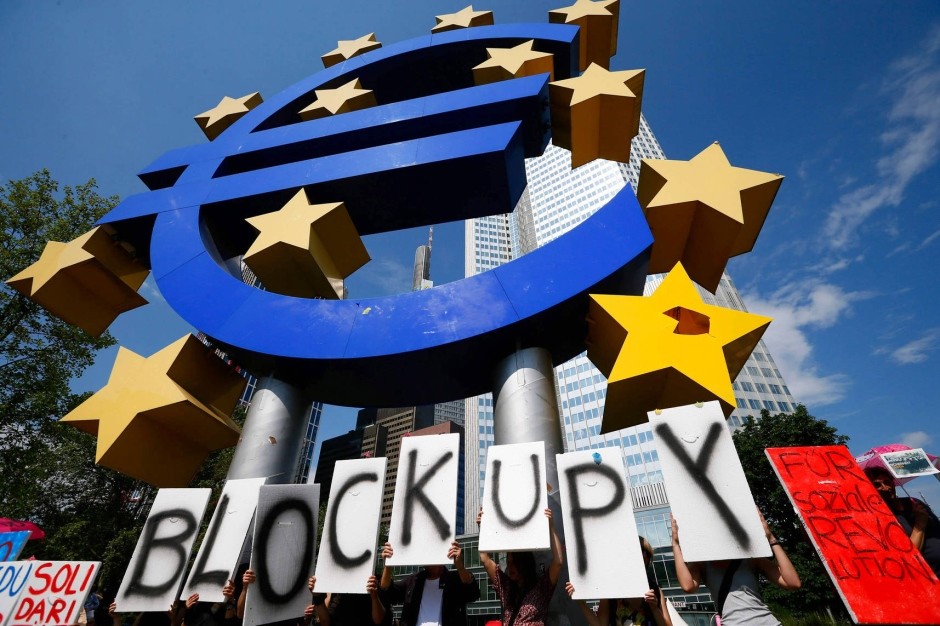(Za 28 feb) Blockupy: Waar zouden we zijn, zonder de ECB?
(English version at bottom) Zaterdag 28 feb, 20:00 IIRE Amsterdam Op deze avond zullen we ons richten op verschillende aspecten van de Europese Centrale Bank (ECB), in het kader van de komende protesten tegen de ECB in Frankfurt.

De ECB maakt immers deel uit van de Trojka, die in Griekenland intervenieert en is naast de Europese Commissie en de Eurogroep de voornaamste drager van het bezuinigingsbeleid in heel Europa. Wat zegt dit op bezuinigingen gerichte beleid over de ECB en haar belangen en wereldvisie? Waarom zijn banken overeind gehouden en worden landen veroordeeld om de brokstukken op te rapen? Wie zijn de winnaars en verliezers bij de ECB-interventies?
Daarnaast is de ECB van doorslaggevend belang geweest bij de introductie van de Euro en was het de voornaamste architect van de ‘manische fase’ van het kapitalisme voor de crisis, toen schuldenniveaus bij alle ontwikkelde economieën door het dak gingen. Dit kaartenhuis stortte in 2008 in en de ECB bleef sindsdien haar centrale plaats behouden in het besluitvormingsproces van de EU.
Hoe heeft de crisis de rol van de ECB beïnvloed, in het bredere kader van EU-instellingen? Deze vragen helpen ons om het grotere geheel te begrijpen in de actuele historische periode in de EU, waarin door bezuinigingen uitgemergelde landen als Griekenland en Spanje de confrontatie aangaan.
Met: Rodrigo Fernandez, Alexander Beunder, Dimitris PavlopoulosGeorganiseerd door blockupy-nl, Real World Economics en IIRE
Deze informatieavond vindt plaats in de aanloop naar de blokkade van de ECB op 18 maart in Frankfurt (zie: http://www.blockupy.org of (Nederlands) https://www.globalinfo.nl/tag/422-blockupy
—————————
Blockupy: Where would we be without the ECB?Saturday Feb 28/ Zaterdag 28 feb.
20:00 International Institute for Research and Education
IIRE.org, Lombokstraat 40, 1094 AL Amsterdam, Netherlands
Debate on the content of the coming Blockupy protests of March 18th.
This evening we will focus on different aspects of the ECB. On the one hand it is part of the Troika intervening in Greece and next to the Eurogroup and the EU commission the main carrier of EU-wide austerity policies. What does this austerity-focused policy tell us about the ECB, its interests and worldview? Why have banks been bailed out and are countries left to pick up the pieces? Who are the winners and losers from the ECB interventions?
On the other hand the ECB was at the center of the introduction of the Euro and main architect of the pre-crisis ‘manic phase’ of capitalism when debt levels exploded across developed economies. This house of cards collapsed in 2008 and the ECB has since remained at the center of the EU policy making process. How did the crisis affect the role of the ECB in the broader set of EU institutions?
These questions help us to understand the bigger picture in the current historical period in the EU, were austerity-ridden countries like Greece and Spain are gearing up for confrontation.
Speakers: Rodrigo Fernandez, Alexander Beunder, Dimitris PavlopoulosOrganised by blockupy-nl, Real World Economics and IIRE
This event is organised in the run-up towards the blockade-protests of the ECB in Frankfurt on March 18th: http://www.blockupy.org or (Dutch) https://www.globalinfo.nl/tag/422-blockupy